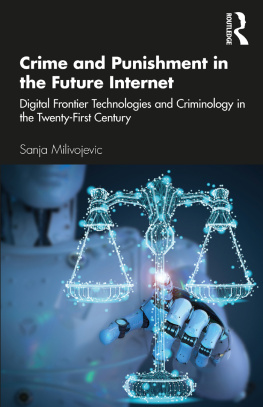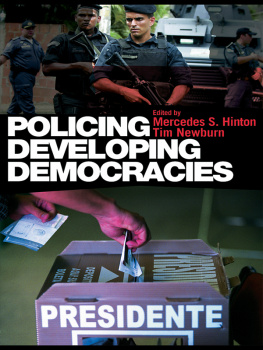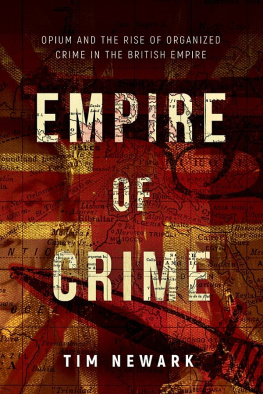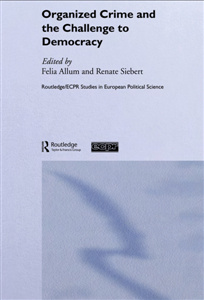
Policing and Politicising Organised Crime
The concept of organised crime is constructed and mobilised by a milieu of complex factors and discourses including a politics of law and order, and international insecurity, combined with the vested interests and priorities of scholars, politicians, government officials, and policing authorities. This book challenges existing assumptions and accepted understandings of organised crime, and explores the ways in which it is amplified and reconstructed for political purposes.
This book critiques how the constitution of the organised crime problem in academic and political discourse provides the conditions necessary for the development of an extensive and international architecture of law, policing, surveillance, and intelligence. It examines emerging challenges and future directions including the impact of technology on new problems, and for transnational policing, such as the ease with which the Internet enables crime to be committed across borders, and for electronic communications to be protected with strong encryption, hampering interception. No other text presents an integrated and comprehensive study of both the politicisation and policing of organised crime, while questioning the outcomes for society at large.
Drawing on international fieldwork and interviews with senior national and supranational policing personnel, this book compares and contrasts various narratives on organised crime. It will be of interest to students and researchers engaged in studies of criminology, criminal justice, organised crime, policing, and law.
Monique Mann, PhD., is the Vice Chancellors Research Fellow at the School of Justice, Faculty of Law at Queensland University of Technology. She is advancing a program of socio-legal research on the intersecting topics of police technology, surveillance, and transnational policing.
Routledge Studies in Crime, Security and Justice
Edited by
Adam Edwards
Cardiff University
Gordon Hughes
Cardiff University
Reece Walters
Deakin University
Contemporary social scientific scholarship is being transformed by the challenges associated with the changing nature of, and responses to, questions of crime, security and justice across the globe. Traditional disciplinary boundaries in the social sciences are being disturbed and at times broken down by the emerging scholarly analysis of both the increasing merging of issues of crime and security and the unsettling of traditional notions of justice, rights and due process in an international political and cultural climate seemingly saturated by, and obsessed with, fear, insecurity and risk. This series showcases contemporary research studies, edited collections and works of original intellectual synthesis that contribute to this new body of scholarship both within the field of study of criminology and beyond to its connections with debates in the social sciences more broadly.
Police Work and Identity
A South African Ethnography
Andrew Faull
Youth, Community and the Struggle for Social Justice
Tim Goddard and Randy Myers
Protests in the Information Age
Social Movements, Digital Practices and Surveillance
Edited by Lucas Melgao and Jeffrey Monaghan
Intimate Partner Violence, Risk and Security
Securing Womens Lives in a Global World
Edited by Kate Fitz-Gibbon, Sandra Walklate, Jude McCulloch and JaneMaree Maher
Policing and Politicising Organised Crime
Monique Mann
For more information about this series, please visit: www.routledge.com/Routledge-Studies-in-Crime-Security-and-Justice/book-series/RSCSJ
Policing and Politicising Organised Crime
Monique Mann
First published 2020
by Routledge
2 Park Square, Milton Park, Abingdon, Oxon OX14 4RN
and by Routledge
52 Vanderbilt Avenue, New York, NY 10017
Routledge is an imprint of the Taylor & Francis Group, an informa business
2020 Monique Mann
The right of Monique Mann to be identified as author of this work has been asserted by her in accordance with sections 77 and 78 of the Copyright, Designs and Patents Act 1988.
All rights reserved. No part of this book may be reprinted or reproduced or utilised in any form or by any electronic, mechanical, or other means, now known or hereafter invented, including photocopying and recording, or in any information storage or retrieval system, without permission in writing from the publishers.
Trademark notice: Product or corporate names may be trademarks or registered trademarks, and are used only for identification and explanation without intent to infringe.
British Library Cataloguing-in-Publication Data
A catalogue record for this book is available from the British Library
Library of Congress Cataloging-in-Publication Data
Names: Mann, Monique, author.
Title: Politicising and policing organised crime/Monique Mann.
Description: 1 Edition. | New York: Routledge, [2020] | Series: Routledge studies in crime, security and justice | Includes bibliographical references and index.
Identifiers: LCCN 2019017624 (print) | LCCN 2019019565 (ebook) | ISBN 9781315158730 (Ebook) | ISBN 9781138067332 (hardback: alk. paper) | ISBN 9781315158730 (ebk)
Subjects: LCSH: Organized crime. | Crime prevention. | Criminal justice, Administration of.
Classification: LCC HV6441 (ebook) | LCC HV6441. M386 2020 (print) | DDC 364.106dc23
LC record available at https://lccn.loc.gov/2019017624
ISBN: 978-1-138-06733-2 (hbk)
ISBN: 978-1-315-15873-0 (ebk)
Typeset in Bembo
by Apex CoVantage, LLC
Contents
Part 1
Contexts, constructs, and contestations
Part 2
Metaphors, monsters, and moral entrepreneurs
Part 3
Infrastructures, empires, and enterprises
This work has have evolved over eight years during which I spent time at a number of research institutions. I thank my colleagues at these institutions for providing a stimulating intellectual environment and supporting this work in various ways: the Australian Research Council Centre of Excellence in Policing and Security (CEPS) at Griffith University, the Regulatory Institutions Network (RegNet) at the Australian National University, the United Nations Office on Drugs and Crime, the Australian Institute of Criminology, the School of Justice at the Queensland University of Technology, and the School of Law and Politics at Cardiff University.
I thank Tom kerstrm, Julie Ayling, Willow Bryant, Dean Biron, Pete Chambers, Angela Daly, Adam Edwards, Russell Hogg, Gordon Hughes, Michael Levi, Jude McCulloch, Murray Lee, Erin OBrien, James Sheptycki, Philip Stenning, and Ian Warren for providing comments on previous versions of this work. Any errors or omissions, of course, remain mine alone. I thank Sidney Dekker, Simon Bronitt, and Reece Walters for their mentorship.
I thank the Interviewees who shared their time and stories, without which this work would not exist.
Anti-Social Behaviour Order | ASBO |
Asset Recovery Agency |







